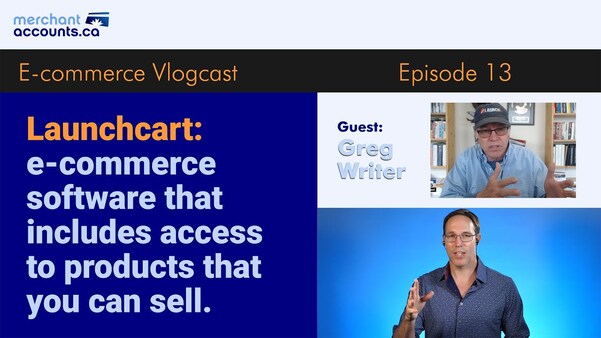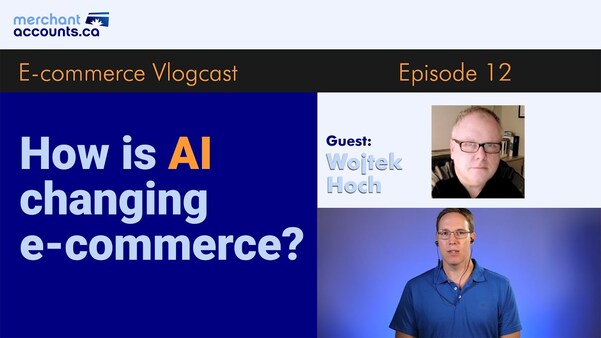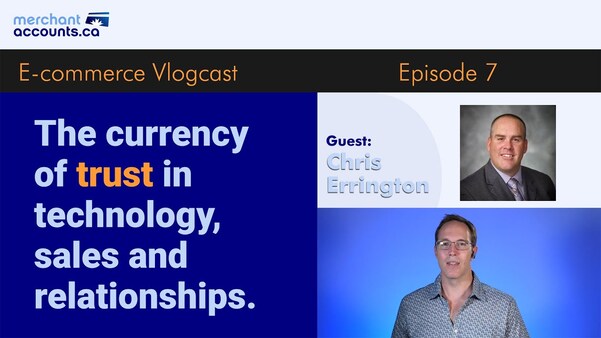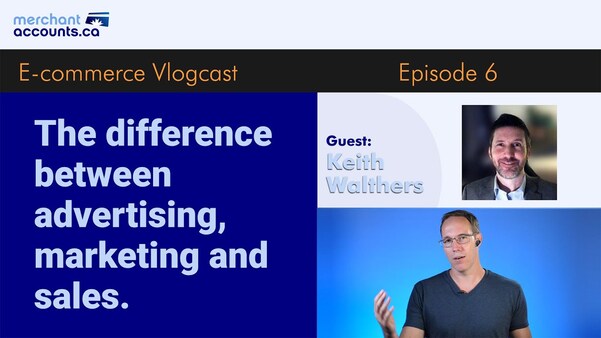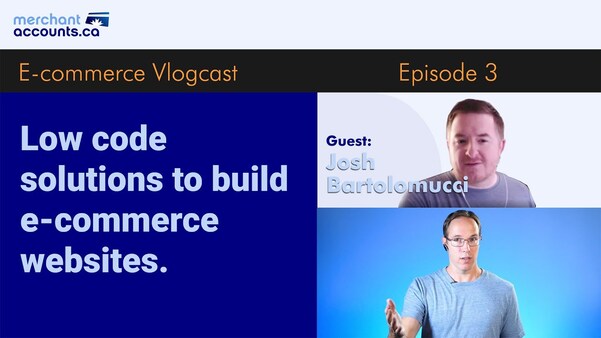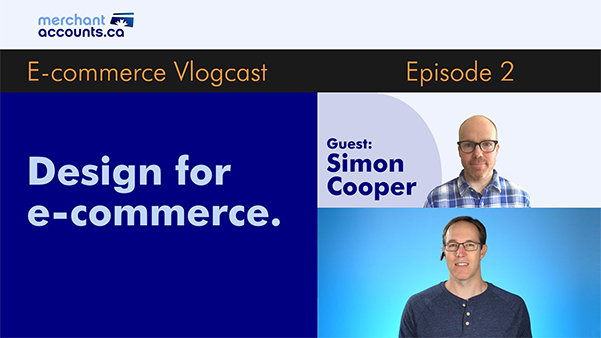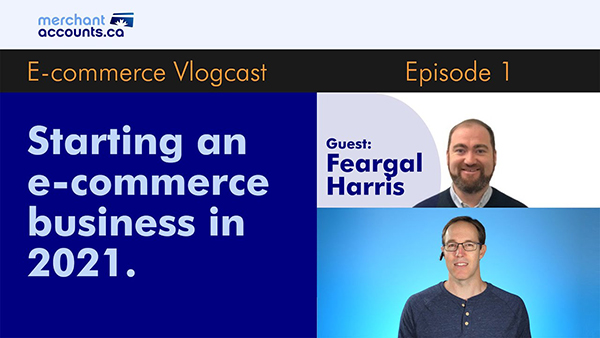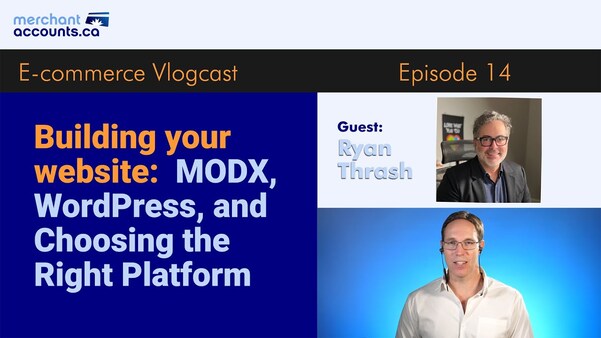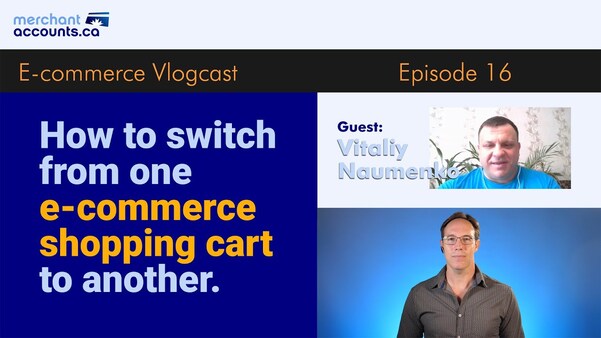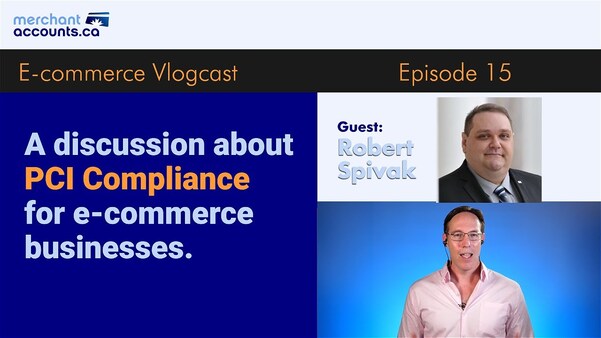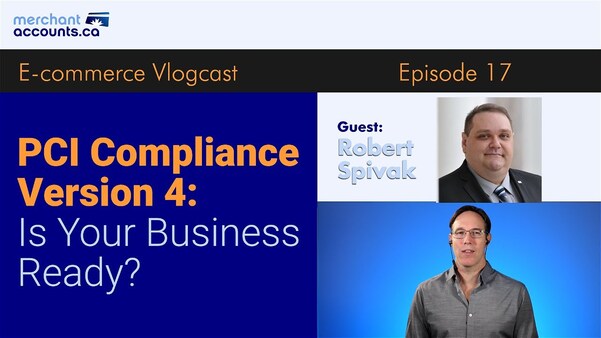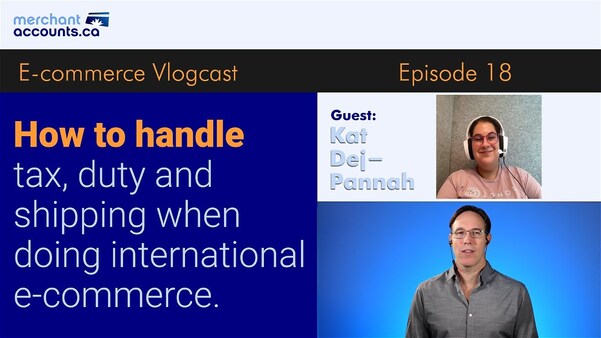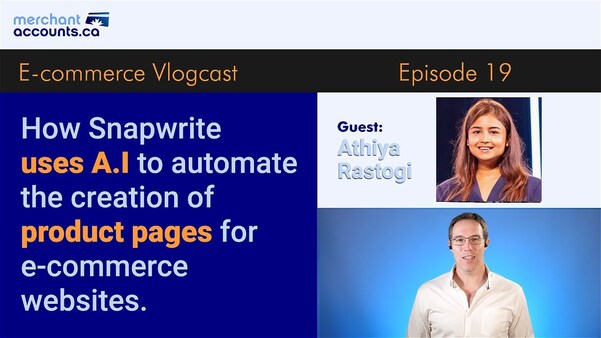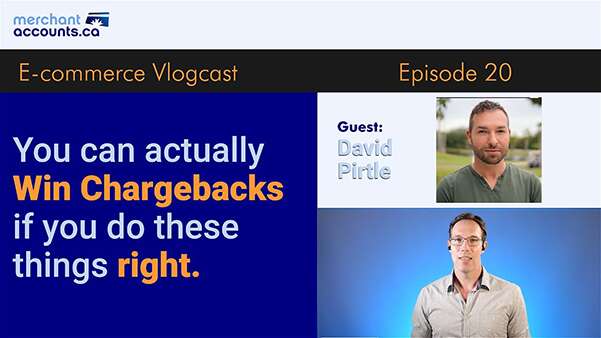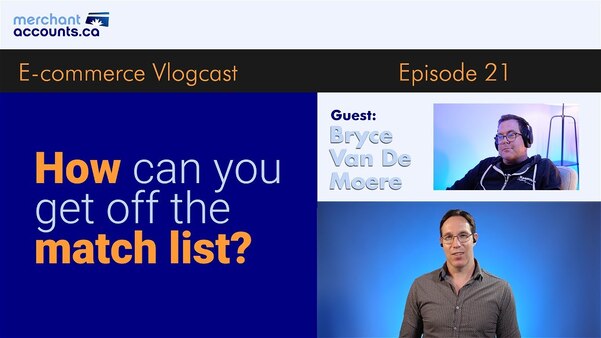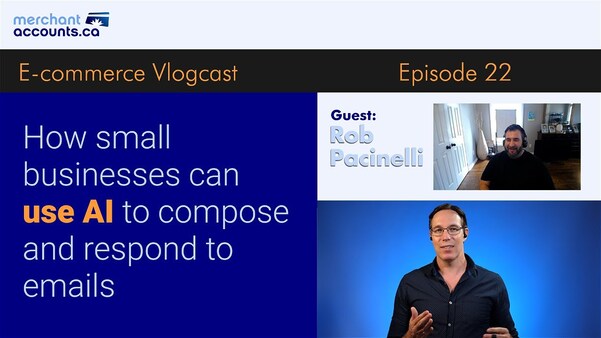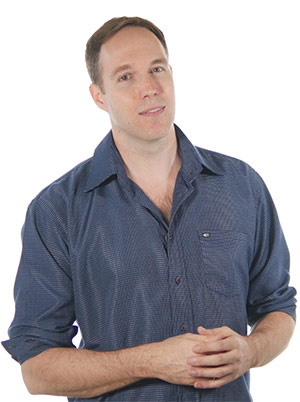March 25, 2022
by David Goodale
The Journey: From realtor to podcaster, to e-commerce entrepreneur
(Slightly edited from video transcript for greater readability)
Introduction
In this episode of the Vlogcast we're focusing on the HUMAN part of business. People think of e-commerce as technology, but behind it it's not run by robots, it's run by humans. The Journey is a series that tells the personal stories of business owners. They share their stories so that we can learn from their successes and mistakes - and pick up interesting insights that they have learned along the way. Today we speak with Justin Loncaric, a career realtor and serial entrepreneur about the importance of finding the right expertise, what he learned when building his real estate team, a growing food delivery business, and his newest project helping home owners get interest free financing to perform much needed upgrades before selling their home. Justin shares some excellent advice and insight that he's learned along his Journey.
David Goodale:
Hello, David here at Merchant-Accounts.ca with another episode of the vlog. Today, we're going to be having a really interesting conversation because we're going to be focusing on the human part of business. People think of e-commerce as technology, obviously it is, but it's not run by robots. It's run by humans and we're going to talk about something that I'm calling the journey, which is our bumpy path that we take in our lives. As we stumble, sometimes we fall, but hopefully we get up. We dust ourselves off and it's those scrapes that teach us the most in business and in life. And I want to talk to interesting people about their journey and the things they've learned along the way today. I'm talking to Justin Long Carrick. Who's a realtor based in Canada and also a serial entrepreneur with a really interesting story, Justin, like all of us has seen his successes and failures and I'm certain we're going to glean some really interesting insight that can, can be applied to any business. Justin, thanks for joining today.
Justin Loncaric:
Thanks for having me. I appreciate the time.
David Goodale:
Wonderful. So I know that you are a realtor. In fact, you come from a family of realtors, maybe just to tell our, our viewers, why don't you just tell, tell people about like your background and kind of your, your career as a realtor there?
Justin Loncaric:
So I, I tell everybody that I've been doing real estate for 41 years. And the reason why I say that is because my parents have been doing it since, before I was born. My mom worked for AE LaPage and century 21 way back in the day. And ultimately I ended up working for her team when I became a realtor 16 years ago. So before that I even had a grandmother that sold real estate in Montreal, in Florida. So it's been a very interesting journey through watching them and actually having a life that was pretty amazing because of it. And that's one thing that I want to stress to people it's like, I really had an amazing life growing up, but the journey wasn't just all roses in, you know, kind of rainbows over that time when I actually ended up becoming a realtor because I had to go through struggles to build my own business as well. So it's been an interesting journey, but certainly like, you know, one that has been well worth the price of admission for me, for sure.
David Goodale:
That's interest growing up in generations of realtors. Was there an expectation that you would go kind of in, because realtor to me, and I'm not a realtor, but there's a, there's a sales element to that. There's obviously a human psychology element to it, because especially when you're younger and you're buying your first house, it's like the most intimidating thing ever did. Did you, were you kind of expected to do that or were you free to do whatever you wanted to do?
Justin Loncaric:
I think in my head, I just wanted to avoid it at all costs. And so I didn't want be a realtor. So I fought it for a long, long time. Eventually it kind of came to a point where I knew that I needed to do something. I had met a woman who eventually became my wife and I needed to have a career in order to support a life with a wife and so on and so forth. And so I made a decision at some point that I had to become a realtor, but the, it wasn't an easy one, but it was well worth. It
David Goodale:
That's interesting, but you're not just a realtor. I I've already said you are quite an entrepreneur. You have lots of projects, lots of irons in the fire. And I, what I really want to talk about Justin is it's like, people's well, like I said, the journey, the, so the realtor was that your first full-time gig is that like, that's what you've been doing forever. But is that, when did, I guess, when did you step away from being a realtor or just a realtor to other projects, tinkering with other things
Justin Loncaric:
I've been tinkering with other things for an like an entire lifetime. So I think being you in a realtor family, you know that these people don't work nine to five. You understand that? I mean, I had a mom that was late for every family gathering and in my entire baseball career, which spanned into the United States, she came to maybe seven of my baseball games and I had thousands of them. Now I'm not complaining about that because I had a lot life that allowed for that and that allowed for the best equipment and all the crazy things that came along with it and hope trips to Hawaii and whatever. But I guess what I'm saying is I understood that nine to five. Wasn't really going to be my jam. At some point, when I was 17, 18 years old, we had a business where we were, are putting up Christmas lights for people. And we did that locally in our town, got a big newspaper article written about us, my, my friend and I, and we were the first company to do it in Burlington. The following year, like seven landscaping companies picked up the idea and started doing it.
David Goodale:
Wait, how old were
Justin Loncaric:
You? Like 18, 17, something like that up. Yeah. And we made like, over the course of four weeks, we must have made like $7,000 for us. That was huge. And it was like, wow, cash, because we were just going out and showing up at people's houses and taking cash. That,
David Goodale:
That's
Justin Loncaric:
Interesting. That's how that kind of sparked. Right. And I had a friend who had parents who were silk screeners, which is their own business. And I worked in that company and understood the, the value of running your own business out of that, my parents showed me the value of it. So like going through it, it wasn't just like, oh, I'm a realtor and now I'm going to do other things. It it's always been kind of on the back of my mind when I was 20, I joined Amway. So
David Goodale:
You know what, okay. I love that because Amway, Quickstar all of those multilevel marketing things. I've had people do those over the years and you kind, you kind of know they're not going to make a zillion. Well, you kind of let me just qualify my language on the podcast. I don't think they're going to make a million dollars doing that, but they're going to, they're going to learn really valuable lessons. It's like, but they've sold you on, on, on this belief and you can make money, like take the concept they're using to convince you to do these things, right. There's a lot to learn there,
Justin Loncaric:
But take, take the concept of passive income and, and extrapolate that into business because the reality of life is such that if you work a nine to five, you're lining other people's pockets with the work that you do, you're making money for yourself. But when you leave that job and you stop that job, like you're literally, I go home at five o'clock you stop making money. Right. But the idea of passive income, which is so heavily built into the Amway model and any other multi-level model, and I'm not saying that it's the way to go. I mean, I'm not, I've never really made anything of Amway, but the lessons that I learned and took from that have stuck with me from day one. Right. That's
David Goodale:
Interesting.
Justin Loncaric:
Yeah. Now take that to real estate. And the idea that I know a guy in our town that makes $6 million a year selling real estate, he's got a team of 30 people that work for, or him. And I know for a fact that he's complaining constantly that he never sees his family and he's stressed out and all these other things.
David Goodale:
Oh. So it's, it never occurred to me because even when you're a big earner, you're still on a treadmill. It's just a really glamorous treadmill.
Justin Loncaric:
It's a glamorous treadmill, but it's all about how you position yourself on that treadmill. Right. Because I can, I, can I, one thing I found in real estate is people tend to have a really hard time leveraging and allowing someone else to do stuff. Right. I've never had that problem because I feel like I jokingly say I'm like eternally lazy. So I'm ready to hand off stuff like as soon as possible, but I hand it off to the right people. I don't just hand it off lightly. Right? The idea behind the, the building a business properly and no slight on that guy, because he's making 6 million a year or his team is making 6 million a year. I mean, he's doing great for himself. And he enjoys the moments that he enjoys, but I just don't want to not ever be there. Like I know that my mom wasn't there for my, for my childhood and for my baseball games, my kids play rep hockey. We travel all over the place. I've been in Florida, Pittsburgh, Michigan, all over the place for my kids, hockey. I've not missed almost a single game. And the only time I generally have is because I'm at my other kids game, because I have two of them and I have to kind of split me in
David Goodale:
That. And that's a pretty good accomplishment
Justin Loncaric:
For me, that's success. And I think everybody delineates us at different levels. 6 million is great. And I'd love to get that to that 0.1 day. But if that's at the expense of my family time, that's not success to me. Right. So I'm trying to do everything I can to build my business differently, using passive levels of income to be able to kind of build out different opportunities outside of real estate as well. And I'm not too is talking about investing. There's other things that you can do. People don't realize how powerful it is to connect human beings together. I think there's a big, there's a big element there. And, and having a list of people, just people, you know, is incredibly value. That's a major asset for you.
David Goodale:
You're talking about the concepts of building a network and leveraging that network
Justin Loncaric:
A hundred percent. Yeah. So I'll give you an example of that if you really, if you want to hear. So I, I recently went on a weight loss journey and the guy that was providing me, basically, I said to this guy, I need to lose weight. And we talked was a nutritionist and he's really good. And he said, okay, well I've got a program where I can provide you the food. So all you need to do is put it in the microwave, heat it up and eat it. You don't have to cook it. You don't have to prepare nothing. And to me that is supremely important because of my lifestyle and the things that I'm doing. I don't have time to prep food. If I, if I don't eat properly, I'm going to be eating at McDonald's or some crap like that. So it was a really good in a really good idea for me, signed up for him over the six months, I've lost 37 pounds feel great.
Justin Loncaric:
Everything's awesome. He calls me at the middle of February and says, Hey man, I'm shutting it down. And I'm like, well, I've got 10 more pounds to go. Like why, why? He's like, well the food cost and the gas cost, blah, blah, blah, blah, blah, blah, blah. And I go, but wait, there's gotta be right. Like how can we figure this out? I also know a guy that started a company that is effectively a grocery online grocery store. And I was like, I gotta call this guy and figure this out. I call him and I go, this guy's complaining of food costs and all this other things. Here's his business model. How can we connect some people together to make this happen? Long story short, a meeting half happens. Another meeting happens. I'm in a couple of these meetings and he's building a business off the back of this other online business that has this online ordering system and this online, fresh food system that he was never able to build before. And I'm making 25 cents a meal. Now it sounds stupid, but
David Goodale:
Sounds stupid. That does not sound stupid to people like that that have the hamster wheel turning in are listening because especially as that scales that could be quite significant.
Justin Loncaric:
Well, and that's kind of kinda like your industry, right? Where, you know, you, you, your percentages in your credit card processing and such like that. I mean, there are small percentages and there's small amounts, but over the course of lots of transactions, it makes a difference. It's that whole adage of, you know, the, I think we still hear the story of how Ray Cox's wife still makes like a penny on every big Mac that gets sold and she makes millions of dollars a year.
David Goodale:
I did not know that actually that's fascinating to
Justin Loncaric:
Me. It may not be true, but I've heard that so many times over, over the course of my life because of this whole, you know, sort of the idea of passive income, but yeah, so I mean, like it's the same idea. So all I did was connect a couple people. I'm not going to be in charge of cooking the food or making the food or delivering the food or any of that crap. I don't want it. I don't have time for it. But because of that connection that was able to take this other guy to the next stratosphere, they're paying me for that privilege. And I'm not saying you have to be greedy about it. There's scenario knows where I probably wouldn't jump in and do and ask for money. But in this case, because there's a business that we helped organize and put together, I'm like, yeah, I'll take my little piece. That's fine.
David Goodale:
That's interesting. You know, one of the things like so, so naturally I'm quite an introverted person. And so I have never been great at com for, or maybe more traditional ways like the chamber of commerce type thing. I've never been good at that pro I'm certain to my own detriment. And so I feel that even though I, I do work with, you know, many, many, many people just because I've been doing this so long now. But I wonder if, if, if you're an introverted person, if it's a little bit harder to go out and build that network and steps that you could take to, to help accomplish, I'm just thinking of myself, to be honest, I'm being very selfish in my thought process here, but I, you know,
Justin Loncaric:
So a couple of thoughts on that, like when, when language like I am not good at, that comes out, I often fall back to, well, I wasn't good at baseball when I was five years old either. And eventually I became good at it and I started to really grow and practice and get better at it. So I think it's about taking small steps to move in the right direction and look at yourself and go, okay, I'm not good at making those connections in like a big group setting. So maybe I go and invite someone out for lunch and it's one on one and it's, and it's just a very simple, now we can go out for lunch, which is nice. And, and we can go and sit and just have a chat or, or a coffee or whatever, start small and build that up because eventually you'll get good at it. A lot of my marketing were revolves around video. I sit on video all the time. I'm a, I'm a, when I get off here, I gotta do a couple of videos for my content. And we were talking about it in a team meeting yesterday. How, when I started, I was terrible, right? Like on video number one, I was terrible. And I was comparing myself to other people that were on video number hundred,
David Goodale:
Right. It's like, why am I not Tony Rob yet? I've already done one video. Exactly.
Justin Loncaric:
So, so, but that's just, that's stupid. And I think that's where people get a little hung up. They go, oh, well, I'm not good at it. And I, they see this guy sitting over here going and schmoozing everybody and think that that's the way you have to be. I'll tell you right now, the guy that's walking around the room, schmoozing, everybody, people are probably talking behind his back and going, what a, what a, you know, there's a, there's a certain level of respect and waiting. You
David Goodale:
Gotta like integrity do it things.
Justin Loncaric:
Right. Right. I was at a conference last year or two years ago where a guy was just walking around, handing out business cards as if that was the way to do things. I don't know who that guy is anymore. I don't know where he is. I don't know. I don't have his business card. I couldn't care less right now if he took the time to actually make a connection with me, I, and, and maybe corner me at somewhere when I was standing at the back and say, Hey man, how's it going? And have a conversation. Then I might be a little more impressed with the guy, but because he was just walking around, handing out cards, like as if that's supposed to work, that that's just not the way it works. But the point is is that you have to take small steps to get to bigger goals.
Justin Loncaric:
You begin with the end in mind and you say, okay, listen, by the end of the year, I'd like to have a list of 25 people that I'm connected with that do whatever I don't know. And then you work your way towards that and you start with one and then eventually it becomes, well, how can I get as many people in a room as possible to connect with them? Right. So I'm going to be a part of a conference next month, or at the end of this month where there's going to be a thousand realtors in a room to me, that's like, I'm going to be on stage for that. And I'm like, okay, a little bit, you know, a little bit of heart palpitations going on, but the reality is, is that's my bread. Like, I love that. And it actually takes like me going one on one and going screw that. I'm going to go big and talk to everybody in the room. And to me that's like then, but you get there eventually, but I think it's just start small and work your way up.
David Goodale:
It's a process. So that's kind of like the concept of the importance of continually developing and continually learning. Because if you just do what, you know, you've kind of painted yourself right into a corner, haven't you,
Justin Loncaric:
Your growth is going to be in your uncomfortable ability. That's where you're going to grow the most. Right. So if you sit and just do the same things over and over again and expect a different result, I mean, isn't that the definition of insanity, first of all, I think so, but you know, some people may hit it off and something goes great, but unless you're actually going to step outta your comfort zone and do something interesting and different and exciting, you probably won't do much more than you're already doing now. Simple as that, it's a, it's a tough pill to swallow for some people because they're like, but I'm working so hard, but it's like, well, what are your results, right. And how do they track? Do they make a difference every year? Or are they just gradually increasing? Are you looking for that massive increase, but that's not coming. And you're wondering why. Right? So it's all about like metrics and figuring out the results and looking for the future, but also using the past to grow and see there's a whole bunch of other elements. But I think the, the bottom line is in order for something big to happen, you gotta start with doing something big to begin with.
David Goodale:
Yes. That, that, that makes a lot of sense to me. And so if you have a business and and you're working really hard and you're, you're, you're not getting anywhere. And basically like you're either suffer if your business is really suffering, most likely your personal life is really suffering unless you are like have Buddhist monk level of stress management, you know, like, but so I saw talk recently and it was interesting. And, and the speaker said that suffering and pain are the incentives for change because if we weren't hurting, then why would we want to change? And it was a really interesting thought that could be applied to so many things. Business included. I think
Justin Loncaric:
As humans, we are conditioned to avoid pain and suffering. That's how we live our lives more so than ever because we live in these cushy, this cushy world, listen within reason. I mean obviously in certain parts of the world, it's not, but as a whole in north America, we are in very cushy surroundings. We have a lot of things that we can surround ourselves with to make us feel good. And we of void pain and awkwardness and suffering because it's in our nature and it's in, it's in our DNA to do so. And the, the unfortunate part is a lot of times in, in that, in that scared fear, painful moment is when you're going to do the most growing in, in personally. And in a lot of times financially, one of the things just to sort of skip back to the conversation about the guy who's got the food business, one of the things that stopped him originally two years ago from growing it massively was the fear and the pain of having to put more money out and having to go to the next level.
Justin Loncaric:
He hit a ceiling where he needed more money and more things in order to grow. It would've been for a short period of time, a step backwards in income because it would've been more expenses and various different things, but ultimately he would've. You been able to leverage through that as he went along and to the next level, which would've been full circle back around to more income and more growth and more leverage and so on and so forth. The problem is a lot of people get stuck in their businesses in that first small pain point where it's like, holy crap, I need an assistant in real estate. Usually your first hire is going to be an assistant. Well, that's going to cost me 40, $50,000 a year. I can't afford that. But can you afford not to have that if you, if you want your business to grow, right. So that'll hurt you short term, but long term it'll create way more for you. I just got off a call with a virtual assistant lady. Who's trying to sell me on her services. And she's like, she's like how much? Like for eight virtual assistants in the Philippines are amazing for 800 bucks a month, I get 80 hours. And she, her whole pitch is, well, how can I get your wife to spend more time with your family? And I'm like, that is the perfect pitch for me.
David Goodale:
Oh, wow. She got, you all figured it out. Yeah,
Justin Loncaric:
Right? Yeah. She's like, I'm like for 800 bucks a month, I can, my wife can go spend more time with our family. Simple as that. Cause she works in my business and that alleviate some of the pressure and pain of the things she does. So, but there are a lot of people that would go, but 800 bucks, but I'm going well. If I were to hire someone in that position, it's going to cost me probably 1500 bucks a month, at least. And they're going to be someone else has to, like, I have to train these people with the VA, someone else trains, the it's a whole set of things. So it's all about going through those painful moments, making decisions. And it's not just like physical pain. It's like, literally like in your pocket book could be pain, but it's, it's making decisions based on those individual moments as they come along to decide whether or not there's value on the other end of them.
David Goodale:
I, I, you know, I, so this is only the, I think the fifth episode of the blog, what I'm finding so interesting about doing them is it's pointing out all my own flaws or characteristics, whatever, you know, my kindness, if I want to be kind to myself, but people are okay, let's go to the furthest end of the curve. Like the, the, the, the, the Vegas enter it gambler who, you know, those guys that are like either broke or millionaires, you know, and it's like the constant. And then the other end of the spectrum is like someone who, you know, would never even go to Las Vegas and there's these different, you know, this is the human psyche personality of it. And so my nature is I'm very conservative by nature. Like I'm, I'm not big into leverage and all that stuff. So these are the types of points where I have to acknowledge and challenge my own limitations.
David Goodale:
Like one of the things that I'm thinking of is like, I can only learn so much. I'm you know, I'm, I'm no, I, I'm not a genius. Okay. I'm I, I, I I'm competent, but I know that businesses can fail when they get to a certain level and then they don't know how to get further. I think this is actually why a lot of high tech, you know, like flying companies, like flying to the moon with 5,000 times valuations, at some point, the brilliant eccentric founder gets to out the door and they bring in somebody that actually knows how to run a business, because, you know, you don't have everything. You might be a visionary, but maybe you're not like a phase two type person. I, I mean, I'm thinking that's, that's probably a thing
Justin Loncaric:
It's a hundred percent a thing. And I'll tell you right now. So just to kind of circle back to my real estate company in March of 2020, I'm really open about this story. You Google me and, and look at some of the stuff I've done. I, I have no issue talking about it. So I'll bring it up here and, and just sort of hopefully bring some inspiration to some people. But in March of 2020, I had $24 in my bank account and I signed up for a $50,000 American training program, a coaching program. And it was one of those moments in my life where we had got to a point where I was on my own with my own little team, doing my own thing. My wife and I were discussing going to this conference. And we went there the previous year.
Justin Loncaric:
I'd done about $150,000 in commission sales for my team, which was between three people as nothing for, for real estate. And I was sitting in this conference thinking to off, I need a change. I need to put my ego aside and realize that I don't know everything, even though I thought I did after, you know, 14 odd years in the business and having parents that were 40 odd years in the business, I don't know everything. I don't know how there's more to real estate. And I think that's one of the challenges in real estate in and of itself is people think they, they can just get in and sell real estate and they treat it like a hobby, but they're not treating it like a business. Right? And so I was able to leverage those people in that coaching program to be able to build systems and models and mindset around the things that were the most important in order for me to grow.
Justin Loncaric:
And I was able to take my bid business from $150,000 in 2019, the second half of 2020, which we had done not much in the first half. We ended up at $650,000. Wow. We were nearly at a million dollars last year, and we're over $400,000 this year in the first two months of the year. So we're doing pretty good. But my point is, is that 24 to dollars into my bank account, I took a flyer to say, I'm going to spend 50 grand. And that's a crazy like Vegas gambling kind of mindset. Like this is my last $24 in the slot machine, BA Bing, like, you know, that kind of thing.
David Goodale:
But, but it is different Justin, because yours was a very targeted investment in yourself as opposed to a, a dice role,
Justin Loncaric:
A hundred percent. I get it. But, but the thought process for a lot of people will be, wow, how could you have spent that much money knowing that's all you had, right. That's the conservative mindset, right? So now we're pushing that boundary. That scale of like, from zero to crazy gambler guy is like way over the 50% boundary to kind of go, okay, like I'm willing to put this money out there, but the question was is like, what are we going to do? Right. How coachable are we going to be? And I was talking to my coach yesterday and she said she had concerns about me because I'd been in the business 14 years. I had parents in it. She didn't think I was going to be coachable. And I, right. Andy and I, my wife. And I said, if we're going to this, everything goes to the side and we just do everything they say, and that's all we did.
Justin Loncaric:
We did everything. They said, we had our moments of like, holy crap, like moments of scarcity, where it was like, oh man, or is this the right thing? Are we doing the right thing here? But it paid off because it, because we stuck to it. And I think that that's where, yeah. That's where we have to really understand that. Like, I look at things like I, that expanded my mind into like, well, that's why I have a nutritionist. I thought I knew how to lose weight, but I wasn't like, you know, I was 257 pounds at six feet and not like linebacker muscle, like I'm talking like pear shape muscle. Right. And, and, and I was not happy. I was walking up the stairs, getting outta breath going, yeah, I'll be fine. I'll figure this out. You know, I can eat whatever I want. As long as the calories. And it was fine. No, that's not how it works. I was gaining and gaining. So I found this guy and I said, I need your help. Right. I, we were having problems with money and how we handled our money. And I thought, I knew how to invest. I don't know how to invest. So I hired a money manager.
David Goodale:
You know what I'm hearing? It's like the, it's hard to admit to yourself that you don't know, because nobody wants to admit that to themselves. That's difficult. That's, it's hard on your ego.
Justin Loncaric:
That's the hardest part, your ego get over your ego first. And then you can make those decisions, ego then money, because it's like, well, Hey, your money, manager's making money off you. Yes. So when people hire me as a realtor, they make money off me. They don't have to, they could sell privately, but you know, they don't know or don't know how to maximize their opportunity. So that's what a, that's what our, my money manager guy does, my wealth advisor or whatever we want to call him. He's amazing. He costs me money, but guess what? He's made me a crap ton of money too, in the last two years. Right. Tax. She there's all kinds of things. Right. Which again, I never knew about, but I thought I knew, but I also don't man maintain my own car. Like it's like, so if I'm going to go take my car to a mechanic, why am I thinking that I can manage my own money and all these other things in my world, there's just too many of them. I don't even, I, it sounds really arrogant. I don't even put, ask my own shirts because the ROI on that isn't valuable to me. Right. Does that make sense?
David Goodale:
Of course it does. It's about knowing your limitations. It's like knowing, listen, next time you want your car fixed. I could work on it, but it will never run again. That's my limit.
Justin Loncaric:
Yeah, exactly.
David Goodale:
So, so it's like finding, first of all, it's valuing your own time because like, like if, if you were to hire me to build a deck for you, first of all, that deck better be no more than six inches off the ground and no more than one person better ever stand on it. Right. Like I, I'm not good at that, but that's not an attack on me because I have value and expertise in other areas. And so I think that's why. And I think so I learned this recently. I have a client with a a pharmaceutical business and well actually they're a prospective client. They're not a client yet. And so there's different laws about selling pharmaceuticals online. So they're a retail brick and mortar pharmacy in C and they are service people in BC and then across Canada and then the us and every one of those three things are you know, very, very different from a regulatory perspective, something of which I can guarantee.
David Goodale:
I'm not an expert. And so they went out and got a legal opinion to try and so that I could take it to, to, to the underwriter to get their merchant account approved. And the illegal opinion was really weak. And when it, when it, I, of course they didn't go ahead. The, the processor wouldn't onboard the account. And I thought about it for a good long time. And I went back to that client a couple of weeks later and I said, look, I don't want you to give up. What I think you need to do is don't just call a lawyer that, you know, don't go with someone convenient, either do some research or let me do some research. And they said, well, you know, this is important to us, but if you think you can connect me, do it. So what I did is I went on LinkedIn and I used a very specific set of keywords to look for an extraordinary niche, legal expertise, which is basically pharmaceutical law across a across country.
David Goodale:
He is like, that's not something there's going to be a lineup of people down the street to do. But I found somebody in Toronto with a small practice that came from a really large practice and then bro out on his own and I called him and I talked to him about exactly the problem. He said, yeah, Dave and I have a colleague in the us that I used to work with. We can cover this on both sides. And like, we will give you an airtight legal opinion. It's like this thing that I've seen a lesson that I've learned over and over again, when you have a complicated problem getting the right expertise and, and something else I I've learned too, a lot of people will say they're experts and this is not to attack anyone. But to really be an it's one to say, Hey, I'm an expert on this. I'm an expert on that. You can be at it, but a real expert. Well, there's a reason that's rare. So it's almost like spending as much time as is necessary more than maybe you'd think to really find a real expert. That's solved this complicated problem that you are trying to solve. They've solved it already. And they have all the knowledge. And I'm, I'm guessing you've probably run into situations like that as well, where you just, you go and get the right people for the right job.
Justin Loncaric:
Yeah. And I think you said it earlier, you said, you're not, you, you don't know everything. Right. And, and nobody can know everything and nobody's, and I like to call it zone of genius. Nobody has massive amounts of genius. There are some people, but very few people. And I look at it like my zone of genius' conversation and sales and talking to people and those things, business building, I'd rather have other people around me that are good at that stuff that can ma send me in the right direction. And that's why we did what we did. I mean, we've done it in multiple date. Like we, we talked about, we have other businesses, I have another business I've brought in three other people as ownership O on the ownership team that have different zones of genius within the business world to be able to build this company.
Justin Loncaric:
Right. And I've done it strategically, because me on my own. I could sit there and try to hammer away at it, but how good is that going to be over the next two years versus having four people that know what the hell they're doing in different areas to be able to grow simple as that. And, and until you get out of your own way, and that's a big problem in real estate. I find in this coach program, I mean the biggest problem these people have is they're like, I just want to do everything. And I'm the, I think that I can do it the best all the time and you're flat out wrong. You're flat out wrong. You could probably do it pretty good. And maybe you are the best at it doesn't mean that other people can't do it. And doesn't mean that your ROI, your time ROI is better spent elsewhere
David Goodale:
Or you might be the best at, or two components of it. But you really, unless you're some sort of God among mortals you're not going to be the best at everything. And
Justin Loncaric:
It's not possible.
David Goodale:
Yeah. Yeah. I totally agree. Now I'm actually thinking about, but I'm going to flip it a little bit and talk about, about the self, you know, like, because we do also learn and we, and we do have the ability to prove and to improve ourselves. And one of the things that I like to consider that I think is helpful to me is, is my own failures about failures. I've had some failures. I, I once did a website selling ultra modern leather furniture. And it was really nice stuff. Like it was custom Italian made you know, we, we would deliver it to the condo we'd take or, or apartment wherever you lived. We'd, we'd remove the old stuff like white glove installation. The prices were better than any anywhere else. Like I covered everything in an absolute money back guarantee. If you get this furniture for one month, we'll take it back out and we won't charge you anything. And I made exactly drum roll zero sales, and I ran that thing for about a year and wow, that like it was I to this day. I still don't know exactly why it failed other than the fact that no customers that's a hint, but you know, I guess I'm curious, Justin, have you ever been involved in a project where you were surprised something failed and if so to, did you take away anything or manage to learn anything from it?
Justin Loncaric:
Well, luckily I've I've not been in many failed projects. I would say that my real estate team was a failure for a while, but I was able to course correct and turn it into what we it into now. So I took, I had two years of just like miserable BS and, and, and then course corrected into what we've got today. I did an investment in a property, a property, excuse me, a company a few years back, which I don't like to talk about. Because I often say if, if, if I, if the investment hit big, everyone would know about it and I'd be like, Hey look what I did. If it didn't hit at all and it all went away, I'd be like never, no one had ever hear, hear me talk about it again, but I'll talk about it here, because it was a bit of a thing.
Justin Loncaric:
But basically like I, I, I walked into this guy's office and he pitch actually he pitched me on the golf course originally. And then I wa went to his office and we did another meeting and we talked a lot about this company that was, had a lot of potential and had a lot of promise and I just blindly kind of said, yeah, here's a check, like have a nice day, you know, very gregarious gentleman and you know, easy to talk to and easy to kind of get caught up in the message in the story. And that to this day, I mean they still post on Twitter like as if they're still doing stuff. And, but it's just like, it's seven years later and I'm thinking this ain't coming back to me. So and I haven't seen a penny, so that's about the biggest failure I've ever had, but what did I learn from that was like, you know, everything you go, you get yourself into to, before you head into it, don't just trust the people that are standing there in front of you telling you about it.
Justin Loncaric:
Do your research, do your, do your, you know, feel, trust your gut too. Sometimes that's a big one because sometimes your gut is right. And in that case, you know, there was a wonky feeling, but I, you know, the money on the back end really swayed me where he was like, if you invest this, you'll make this. And I was like, wow, that's a lot of money from a small investment. Long story short you know, research and, and time to really digest. I had another, a pitch meeting the other day with another company that's asking me for money just as an investment, like a capital investment in this privately held company. And you know, I listened and it sounded wonderful and it was beautiful on this call that I was on, but I was like, yeah, thanks guys. I'm going to take all the info and I'm going to really dig into it and figure it out before I spend any money on this. And, and I think that that applies to almost anything you do, you know, I'm about to hire this VA, I'm going to check into them and make sure I everything's kosher with them. And that they're their, their, you know, their testimonials are real and true and so on and so forth. There's it takes time to do these things, but preparing yourself that way and, and doing the, the sort of the, the research and the backend work before you jump head long sometimes can save you thousands and thousands of dollars in the long run.
David Goodale:
Oh, of course it can. I mean, you know how you can never, you can never fail by never doing anything. That's not a good approach. So I think it's more about, you know, you're managing your risk, you're being prudent. Like I don't, and, and failures can be really small, you know, by the way, it could be like, Hey, you know, like, okay, something@Merchant-Accounts.ca that I have never done is outbound sales. We've always been inbound, but a lot of merchant services businesses do an outbound, you know, some outbound sales effort, of course, you know, in fairness unfortunately the payments industry, some companies are really great. Some companies are a little bit sleazy if I, I don't know, I don't know a softer word to use. And that outbound hard sale is something that I never really wanted to get into. But I am thinking about trying to go about it in a really ethical way, like very targeted niches and hire salesperson just to like really reach out on an individual basis. And if it doesn't, well, if it doesn't work, you know, I'll, I'll keep my eye it and it's not like I'm going to hire 300 people in a call center. It's like, see if it works and, and, and manage the risk, you know, as opposed to just jumping, jumping all in on something.
Justin Loncaric:
So let's flip the script on it a little bit and kind of look at it like, okay, well, what could you be doing other than just calling, if you think the calling's uncomfortable and that it creates a laziness in your industry. I look at marketing in a different way. If you think anybody listening to this right now or watching this right now, close your eyes and think about a realtor, you know, in your area and sort of go back to some of the Facebook and marketing they've done on their social medias. And it's probably all the same crap, just solds, just listeds. I'm so excited about my client's journey, you know, that kind of stuff. And to me, none of that works because it's not bringing value to anything that anybody does to me, based on my experiences with you, your value is you because you are the person that has brought immense value, the transaction that we're working towards, or the, the business that we're working towards.
Justin Loncaric:
And so to me, you want people to know about that. And the only way that message is going to get across in an effective way is probably through some sort of marketing program. And if you're going to do it like some sort of targeted marketing marketing program, there are ways to do it that could theoretically be online through LinkedIn, B2B through Facebook in, in ways that you don't understand, because you know what a lot of people that use your product are humans, even though they're, you know, LinkedIn is for business and your B2B, there's still humans behind that, right? So, and humans are on Facebook. Most humans, a lot humans are on Facebook. And so there's ways to create marketing and targeted marketing around those things that are not sleazy, but they tell a story. And it's not just your typical in your face marketing program. Here's my rates, you know, that kind of crap doesn't work. What I need to know is, or what you need to know is what is the pain point of my clients that I best serve and remove, and how can I get that out there to those people? Because there's like, if you try to market to everybody and like cold calling for example is a form of marketing to everybody, which is basically blanketing a list of people over a wide birth. You're going to get people that you don't even want to work with.
David Goodale:
Yeah, no, you're totally right. It's about, you know, how I've always said it, you, you talked about pain points. I always say it like, what's the problem that people have that I can solve that I can really genuinely help solve. And probably building you know, some sort of effort, I don't know, marketing efforts around that.
Justin Loncaric:
So, so here's, here's what I found. Okay. So I, I tried with another company to get approved and the process was clunky and not very informative and not very helpful. Right. Whereas the process that you and I have gone through over the, I mean, I've, I've stalled the process more than anything because of the way things have gone in my company trying to get to the end result. But the point is, is that the process that you and I have gone through has been dramatically different than that original process. And I'll tell you right now that original process was a friend who was giving me some sort of discount. I don't even really know or understand the discounts in your industry. It is what it is, but it was a friend who I was trusting to give me the right advice and the right stuff.
Justin Loncaric:
And it turns out that that guy, his customer service and the things that he brings to the table didn't really get me to the end goal. And I was nowhere further forward after having gone through everything I went through with him forward, fast forward to starting a relationship with you and, you know, not, you know, not withstanding the time in between our last conversation and to day which we we've revived this conversation to get finalized and we'll have something done the time you've spent with me. And it's much shorter than the time I spent with that guy has been far more fruitful for me to understand the industry more than I've ever understood it before. Oh, that's right. And understand what I need in order to get approved and get moving forward with this new company than I ever had before. Like I had conversations where people were making me feel like crap.
Justin Loncaric:
Like we had a, I don't even remember the name of the company, but a, a, a service provider in your industry, on the phone with me, their management team, trying to talk with me and tell me how stupid I am for doing what I'm doing. And I'm like, what are you talking? Like, why are you doing this to me? I'm trying to spend money. I'm trying to make you guys money using your services. And you're basically treating me like crap. And that has not happened once in this, in this conversation. And that to me is a superpower that you need to get out there, your advice, the things that you bring to the table and the knowledge that you have in this industry to help people get what they need is a massive step forward from some of the things I've seen in the past.
David Goodale:
I really appreciate that. I, and I'm finding that one of the benefits of doing these, these vlogs is I'm getting so much good advice from people just talking to them and you're making me feel good about myself. Thank you. But that's
Justin Loncaric:
Always a positive.
David Goodale:
That's awesome. You know what, then let's, let's talk about your project if you don't mind, because I'm sure the viewers, if you're okay with it, maybe tell folks about the project that you're launching. I think it sounds pretty interesting.
Justin Loncaric:
Yeah. So we're launching a CU, a company called listing loans. It's a Canadian based company for now. So if you're in the us, I'm sorry, but we can't service you yet, but we will eventually we are in Ontario at the moment and looking to expand the idea behind it is we're selling directly to realtors, a tool with which they can actually provide their clients, their sellers and their buyers money in order to allow them to renovate and update their homes. But this is a deeper level product than, than just that. So, yeah. Okay. I can, as a realtor, I can walk into a seller's house and say, okay, great. I'm going to get you a cash advance of $10,000, and we're going to do this, this and this, and that's great. But at the end of the day, what's more important in what we're doing is I kind of got sick of this industry chasing ourselves to the bottom of the barrel when it came to commission.
Justin Loncaric:
I mean, we, oh, it's, it's awful, right? Like, I mean, I had a convers and with a lady today, who's like, well, if, if you were my friend, I'd be charging you half a percent. And I'm like, we're not friends. Sorry. Like, yeah, I don't do that. And even with my friends, they want me to give them the best service. So they're going to pay me the, the, you know, the money I ask anyway. But the point is, we're constantly doing that. I've lost a couple listings in the last six months because someone else charged less. And so then when we try to bring value as realtors, we end up throwing more stuff at listings. So we're looking at it going, okay, well, I'll pay for painting. I'll pay for staging. I'll pay for you to go to the, a hotel for the weekend while it lists.
Justin Loncaric:
And, and I have to have you outta the house, you know, and, and people are going through, I'll pay for this. I'll pay for dog and babysitters and everything in between. And then I'm like, well, okay, let's say I have three or four listings and I've paid $10,000. Now I've got $30,000, $40,000 sitting out there. And it's, and it's, there's no guarantee that any of that's going to sell or come back to me because if those people decide to not, not sell with me or blame me for it, not selling, I'm done that money is, could be gone, you know, or how could they, if they couldn't afford it in the first place to pay it, how are they going to pay me now? Right. So there's a lot of risk involved in that. And, and then the last thing is, is I also look at opportunity to make more money in these deals.
Justin Loncaric:
And, and I, it sounds bad, but it's, you know, everyone's always trying to squeeze profit outta these deals. And so I look at opportunity to bring more value, which ultimately allows me to actually make more money. And this is what we're doing with this product. So I'm teaching agents, I'm going through the process of educating agents to be able to use someone else's money, which is the most important part to be able to transact a real estate deal and get a, get a hell house sold for the most money possible while still being able to keep their money in their pocket. And then at the back end make more money than they were previously making with just a bare bottom bare basic commission rates. And then, you know, no more cutting commission. I hate this cutting commission garbage happening all the time. Right now. Sense. Part of sense. This is,
David Goodale:
I hope that makes sense. It does it. And because I've worked with you, I know a part of it, and this is interesting to me, a part of it is a financing element for the homeowner, because some of these folks, like you said, they listen, I know that, okay, I'm not a realtor guy, but I know kitchens. There's certain areas that you want to spend money that tend to recoup it. And so if you have a, I bought a house one time in BU it was a, it was built by a crazy artist. And I mean, a literally crazy artist. It was very interesting, but I'll put it this way. You did not want to cook food in the oven. You didn't, you did not want to put food in that fridge. And so doing the kitchen, if I didn't have the money, you would need money, money to do that. And that's a part of this project, right? There's a financing element for it.
Justin Loncaric:
Yep. Yeah. The idea is, is that an agent will come to your house and say, listen, we've gotta do all these things in order to get it ready for sale. So my pitch to people is this I've got three commission levels, okay. Commission level one is, and just for bare bottom. And I'm using a generalized commission structure, but bare bottom is 2% because it could be three or four depending on the location you're in. But bare bottom is 2%. And with 2% you're going to get photos, video, all the good stuff that I normally do. All done. You gotta get the house ready, all throw in a staging consult, which costs a couple hundred bucks, 300 bucks, something like that. And all of that's in the 2% level, you go to two point ha 2.5% for me, I'll get you a $10,000 cash advance that will allow you to spend that $10,000.
Justin Loncaric:
It's free money for six months. You don't have to pay any interest on it for six. And, and it's not like the interest is accrued when you pay it. It's just literally, if you take 10,000, you pay back 10,000 within the six months and that money, then with that money, you can spend it on staging or if you have to do painting or whatever you need to do, you can go from there. I can get you up to 25 grand if need be. But 10,000 is what's included in the two and a half amount.
David Goodale:
Okay.
Justin Loncaric:
Or I can go to 3% and at 3%, I'll get you a $25,000 cash advance. And with that cash advance, I'm going to mobilize my entire team where we're going to organize your pod, which will help you with your moving because you'll put all your stuff in your pod. We're going to mobilize the, the the stager. We're going to mobilize the painter. We're going to mobilize the cleaners, the carpet cleaners, the construction guys that need to come in and fix the door handles and hinges and toilets and things that need to get fixed. We are going to handle all of that. You are not going to lift a finger. All you're going to do is write a check because that 25 grands now in your account, when these people need to get paid, you're going to pay out these people. And the best part about that deal is I'm going to rebate you 50% of, of the money that you spend at the back end on my commission. So in the end, what ends up happening is is that you might only spend five or seven or $10,000 more than the 2% commission rate,
Justin Loncaric:
But you're getting value of $25,000 more out of that. So for me, as a realtor, into individually, I'm making five, seven, $10,000 more than what I was willing to accept at 2% with no other bells and whistles, the house is going to sell for more money, because it's going to look better and present better just by, by default because of the stuff we're going to do to it. And we're going to make more money across the board as a whole, the homeowner's going to make more money. I'm going to make more money on my commission percentage and I'll make a few extra bucks on, on the on the rebate scenario at the back end where I only rebate them half and they, they end up paying for another, the other half of it. So it's a win-win for everybody. And it brings a massive amount of value. We just finished a hoarder house in Georgetown, Ontario that literally the guy had been in 2016, his wife passed away.
Justin Loncaric:
God bless him. It was terrible. It was very sad. And he had just built up this amount of stuff in his house because he was in this mental state and it didn't make sense. We, he, for two years, he's been trying to clean it. He's had bins on his driveway and done nothing. In 10 days, we got him a cash advance of $25,000. And in 10 days, my team organized the entire set of things to have pods, to have declutters come in and pull out all the stuff with within three days, all the hoarding stuff was out of the house. The house was completely clear, then it was floor cleaning. Then it was painting. Then it was sta then it was staging and cleaning. And by in 10 days we were completely ready to go, got him on MLS and actually got him one of the, the highest values in the neighborhood.
Justin Loncaric:
Not, I'm not going to splash that. Oh, we sold over asking because we did, but that was on purpose. We set it up that way, but we got one of the highest values in the neighborhood because we leveraged the power of that 25 grand. Now I could have said, I'll write you a check for 25 grand and pay for all that. But what is the risk in that if it doesn't sell, because he was very emotionally unstable as a whole, through the whole process and it was very difficult to get to the end. And what if he's suddenly decides I'm not selling my house
David Goodale:
Right then as the realtor you're on the hook for that. Yeah.
Justin Loncaric:
Right.
David Goodale:
Okay. So
Justin Loncaric:
We've now created a scenario where it all gets dealt with on the back end there's rebates and things that we deal with and everybody wins. Everybody wins and I'm providing massive value. And that guy is raving about me because he is like, I can't believe what these guys did in 10 days
David Goodale:
That no that's really
Justin Loncaric:
Good. And the time it was 12 days we sold it.
David Goodale:
That's fascinating. You know, one of the things that's really interesting because I first of all, I've changed as I've matured or gotten older, whatever. But so I, I used to have an employee who was very, very frugal. That was his personal nature. And when he would do quotes, he would, he would always undercut everything. You know what I mean? And right. And, and he didn't value his time. Now, when you're telling me about like for an extra half a percent, I'm going to deal with, and you just was like a laundry list of stuff. It's like half a percent. Like I have another friend who doesn't want to deal with anything ever. And he's a business owner. He's a very successful guy. And it it's like the value of solving the value of your own time. Coming back to what you said with your wife and the assistant, you may be hiring from the Philippines. It's like valuing your own time is worth so much you can't, but not everybody sees that that way. I guess that's why you have the 2% commission tier, but people that understand value should be all over that because at least into some circumstances, because holy moly, I don't want to clean a hoard house. I want the thing sold and I want the deposit and I'll just go somewhere clean. Thank you. You know, it's anyways. That's how my thought process
Justin Loncaric:
Works. Understandable completely.
David Goodale:
Yeah.
Justin Loncaric:
Yeah. Yeah. And I think that's the point though, is because if, if we'd, if some other agent had walked in there and said list it the way it is, what would that result have been? Right. And, and, you know, a couple of things that this does. One, if I'm a small agent just starting out, I can use this tool to compete with the big agents that have the money to be able to do this on their own. Anyway, it's like my target market is not these big agents that are spending that kind of money. Anyway. If they want to come to me and, and be a part of our, part of our thing and, and use our money to be able to help create their, their wealth and their thing in their company, that's fine. But generally speaking, we're the medium to small agent target market because we look at that as the opportunity for guys just starting out and gals just starting out like me, that kind of came from nothing that, that can't compete with someone else bringing value in that regard.
Justin Loncaric:
Now they can't right. They couldn't do that before they didn't have access to. There are some companies individually that do it. I think gosh, properly is a real estate company that actually has this built in thing where you can get 20 or 25 grand out of them to be able to do some renovations on your home. But that's that company, if you don't work for them, you don't have access to those funds. Right? Right. We are not like a payday loan company. We haven't built this around kind of quick money and high expenses and stuff. It's cheap money. It's quick money in order for it to happen fast so we can get things done quickly. And the homeowner really is the one that benefits the most because ultimately they put money into their house in valuable ways that you control as the realtor, the process and help them through that process in order for them to actually end up making more money in the end.
Justin Loncaric:
There's no downside to anybody for this because this money can be used to help everybody make more money is really the bottom line. And that's my biggest hurdle actually, to get over because people don't think like this, they think of it like a loan and they give it like, you know, I can go to some of these quick loan companies. We hear the commercial on the, on the radio all the time. You know, you can get these loans. That's not what this is. It's not designed that way. It's not a super high interest rate product. It's a product that allows people to take advantage of an opportunity that is coming. They have to their house. And now we can leverage that into success all around for them. And yeah, we make money off it, because it's alone. We're giving you our money and we want to make money, but it's not like we're gouging. We're not looking for that. We're looking for an amenable solution for everybody to win. That's the point
David Goodale:
It's yeah. It's a mutual come
Justin Loncaric:
From a place of contribution.
David Goodale:
Yeah. Yeah. So what's the, what's the website going to be in case people? I don't think it's launched yet, but tell people in case they're watching and they want to jot it down.
Justin Loncaric:
The website is www dot, listing loans, dot CA
Justin Loncaric:
And pretty straightforward. You can go there and book a call with me directly on one of the links on there. And I'm happy to, if you're a realtor and you want to get involved by all means, if you're a, if you're in the general public and you're not a real estate salesperson, we don't sell to the public. That's part of the catch. Like we will not sell to you, but call your realtor. If you're about to list your home and say, Hey, we want to be a part of this product and your realtor can call me directly and we can actually have a meeting and set it all up and get it done. We can have funds transferred within 24 hours of most people's conversation. So it's a pretty quick thing. And simple, easy, online. We were talking about online business before it's all done online. I don't, nobody has to be in person, all gets transferred. Everything's good. So
David Goodale:
Justin, you've been super kind with your of time here today and I think we're pushing up against our hour, but before we wrap it up, I always ask this question. And usually I say, what secret advice would you share to e-commerce merchants? And I know that you, you are launching this online business. You have other projects, but because you have such an interesting expertise, I'm going to qualify. It doesn't have to be e-commerce. What C advice would you share to any business owner? This is a car blo thing. I know you weren't prepared for this question. No,
Justin Loncaric:
I'm totally prepared for this question. Are you
David Goodale:
Okay? Well now I'm listening. I want to hear, okay.
Justin Loncaric:
I read a book called be obsessed or be average probably three years ago. That was by grant Cardone. Anybody that knows sales knows that grant Cardone is big in the sales industry. And he, he wrote that book. I would highly suggest you go listen to that book. I say, listen, because he tells the story rather than reading it, because it, when he tells it on the audio, it's just different. It hits different. Okay. The message of that book that struck me, that really shifted my mindset was the idea that everything that happens to be happens because of me, I am in the position that I'm in today because of me blaming other people for my misfortune and my misgivings is not going to serve me and get me moving forward in the right direction. I have to take responsibility for my own stuff. And I say stuff because I don't want to swear on your podcast.
Justin Loncaric:
And the reality becomes that you could even look at it like, you know, he uses one of the examples in the book like you're you work from home? You you're talking about e-commerce business, right? You work from home. A lot of you folks that are in e-commerce right? You have home offices and things. The reality becomes if your power goes out in your house, whose fault is that? Is it the city's fault? Well, maybe, but why didn't you set yourself up properly? Because you have an e-commerce business that you have a generator out the back of your house so that when your power goes out, your business never stops. Right? The things that you're doing and the thing, the connections that you need to have within your home, never stop. That's your fault for not having that, backup it up. That's
David Goodale:
Right. You're you're talking about being accountable to yourself or your decisions
Justin Loncaric:
Being accountable to yourself right down to the minutia of why didn't you leave five minutes earlier. If you got in that car accident, why didn't you leave? You know what, like there's, there's a bunch of different, psychological mindset, things that are involved in that. And yeah, it breaking it down to the minutia can be incredibly stupid sometimes. But I think if you take away the victim mentality from your world and stop blaming other people for the stuff that's happening to you and take responsibility for all of it, your world will change. And the, as part about it is you'll start seeing other people around you blaming other people for stuff that's not other people's fault. And you'll look at them and you'll go, that's just embarrassing that they're even about that. And you'll feel awkward about their stupidity. Right? And it's funny, because I've seen the transition in my own mind with people around me. So, so stop blaming other people, stop being a victim, take control of your own situation, no matter where you're at, what you're in, what business you're in. It doesn't matter. You want more go get more and it's up to you. If it's up to, if it's up to, if it's going to be it's up to me, that's what someone told me one time. And there you go. So that's my secret advice for you.
David Goodale:
Secret advice. I'll tell you, even if you're listening to the, and you don't have a business applied in your life, you probably attach that to relationships, to you just write the whole list. That sounds like you can apply that to pretty much every situation, you know, so, or virtually every situation Justin, that that was absolutely awesome. And I have totally really enjoyed this conversation. I I'd love, if you could tell our viewers where they could find you in case they wanted to talk to you about some real estate or your other projects, what can they get you?
Justin Loncaric:
My, because of my marketing and my social media, I am completely wide open all over the interweb. So you can just Google Justin Loncaric. Loncaric is my last name and my Facebook will probably pop up. You can text me right through Facebook and I answer all those. It's, it's a wide open profile because that's how I market. It's what I do. I use Facebook as a tool and so that anybody in the general public can go look and find me there.
David Goodale:
Awesome. Justin, thanks so much. This was really great. And I, I appreciate it.
Justin Loncaric:
No problem. Thank you for having me.
David Goodale:
Okay. Thank you.
Need professional guidance?
Contact us for a free one hour consultation.
Can I Help Lower Your Processing Fees?
If you found this content helpful, will you give me the opportunity to quote on your business?
View Rates


